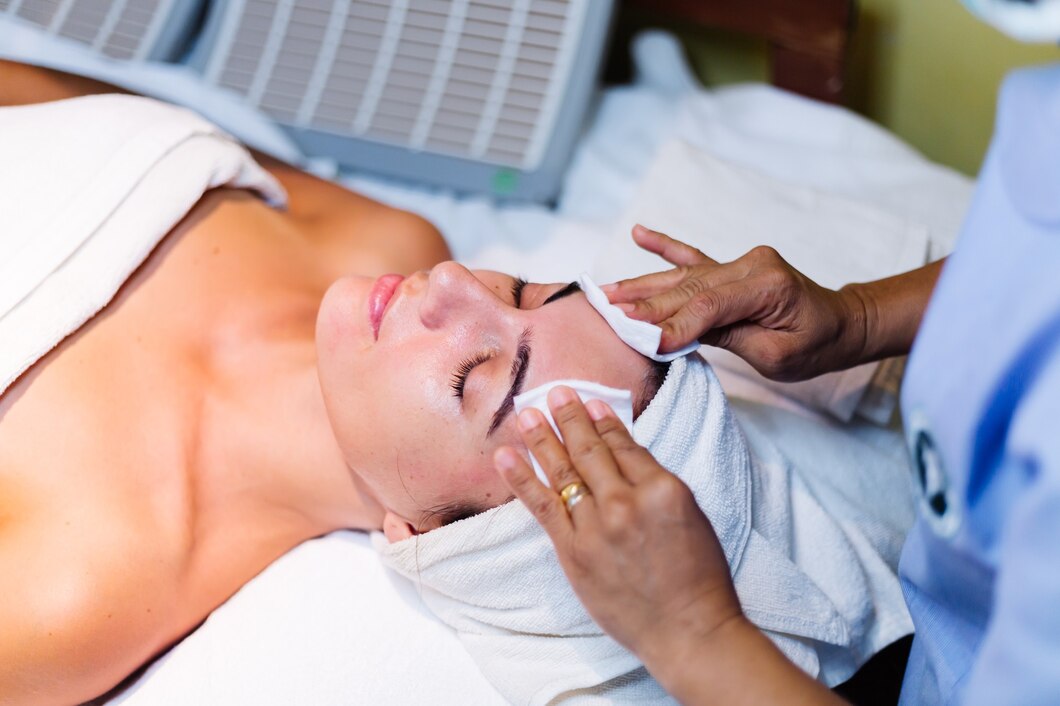Chemical peels are gaining popularity among South African women for their ability to rejuvenate the skin by removing the outer layer and revealing smoother, more even skin underneath. Here’s everything you need to know about chemical peels before taking the plunge:
1. What is a Chemical Peel?
A chemical peel is a cosmetic procedure where a solution containing various acids is applied to the skin, exfoliating the outer layer. As the skin heals, fresh, healthier-looking skin emerges.
2. Types of Chemical Peels
There are three main types:
- Superficial peels: These use mild acids like alpha-hydroxy acid (AHA) to treat the outermost layer of skin and improve texture and tone.
- Medium peels: These penetrate the outer and middle layers of skin to remove damaged cells, often containing trichloroacetic acid (TCA).
- Deep peels: These use stronger acids, such as phenol, for more dramatic results but require longer recovery.
3. Benefits for Skin Texture and Tone
Chemical peels can dramatically improve uneven skin tone, reduce fine lines and wrinkles, smooth rough texture, and lighten dark spots and pigmentation issues, leaving your skin looking more youthful and radiant.
4. Best For: Hyperpigmentation and Acne Scars
For South African women dealing with post-inflammatory hyperpigmentation, melasma, or acne scars, chemical peels are highly effective in fading these imperfections, especially in combination with other skincare treatments.
5. Customizable Treatment
One of the best things about chemical peels is their adaptability. Depending on your skin type, tone, and goals, dermatologists can tailor the concentration of acids and depth of the peel to suit your specific needs.
6. Not a One-Size-Fits-All Treatment
Darker skin tones, which are more prone to hyperpigmentation, require special consideration when undergoing a peel. Medium and deep peels should only be done by a specialist experienced in treating diverse skin types to prevent complications.
7. Expect Mild Discomfort During Treatment
The sensation varies depending on the strength of the peel. You may experience mild tingling or stinging during the procedure, but this is generally temporary. Your dermatologist will likely apply a soothing ointment afterward to help with any discomfort.
8. Downtime Varies
Superficial peels require minimal recovery, and you can resume your daily routine immediately. Medium and deep peels, however, involve more peeling and redness, with recovery lasting up to two weeks.
9. Pre-Peel Preparation
Before undergoing a chemical peel, it’s important to prep your skin. Avoid using retinoids or any other harsh skincare products at least a week before treatment. Your dermatologist might also recommend a skincare routine to help your skin heal faster afterward.
10. Post-Peel Care is Critical
Post-care includes avoiding direct sunlight, applying sunscreen religiously, and moisturizing your skin to speed up healing. Using gentle, non-irritating products is essential to protect your newly exposed skin.
11. Chemical Peels and Sun Protection
South African women, especially those exposed to the intense African sun, must be diligent about wearing broad-spectrum sunscreen after a chemical peel. Your skin will be more sensitive to UV rays, making it prone to sun damage if left unprotected.
12. Multiple Sessions May Be Necessary
Depending on the severity of your skin concerns, you may require several peel sessions to achieve optimal results. This is particularly true for issues like deep acne scarring or extensive hyperpigmentation.
13. Potential Side Effects
While chemical peels are generally safe, side effects can include redness, swelling, and peeling. In rare cases, especially with deeper peels, scarring or infections can occur. This is why choosing a reputable practitioner is crucial.
14. Results Can Be Long-Lasting
With proper skincare maintenance, the results of chemical peels can last for several months. Regular use of sunscreen and skin-nourishing products can extend the benefits of the peel, keeping your skin smooth and glowing.
15. Consult a Professional
Before opting for a chemical peel, consult with a licensed dermatologist or aesthetician. They will assess your skin type, tone, and any underlying conditions to recommend the most suitable treatment.
Chemical peels can be a game-changer for South African women looking to improve skin texture and tone. By removing the outer layer of skin, you reveal a brighter, smoother complexion. However, it’s essential to choose the right type of peel, follow pre- and post-care instructions carefully, and work with an experienced professional to ensure safe and satisfying results.








